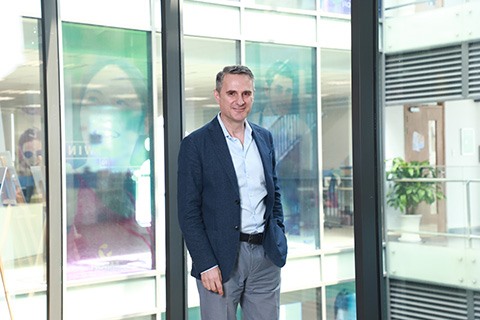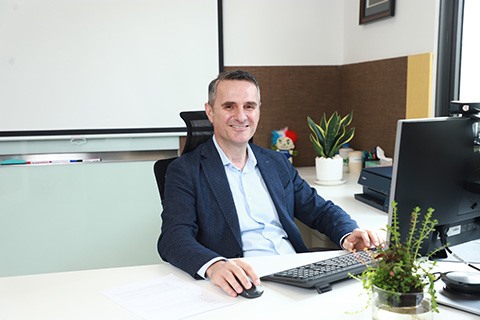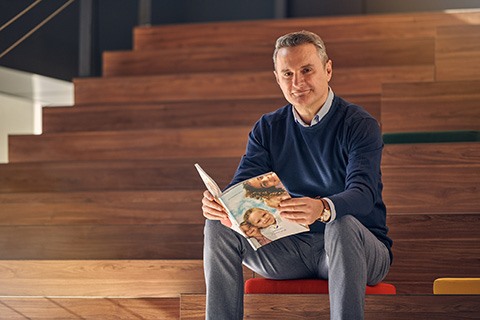

For Emin Turan, practicing medicine as a doctor and running a pharmaceutical firm are not contradictory paths – both are in the business of saving lives.
The CEO of Sanofi Vietnam & Cambodia says he does not regret the choices he’s made – first to become a doctor after graduating from high school, then moving to the pharma industry as a businessman.
Even as a child, he dreamt of becoming a businessman and travelling to different countries.
“When my primary school teacher asked the kids what we wanted to become when we grew up, my friends said astronaut, fireman and so on. But I wanted to be a businessman and see the world.”

|
Since he was a good student, he followed the “classic way” in Turkey by becoming a doctor. “In the exams to enter university, I put medicines as my top choice. Beneath was business administration and some engineering stuff,” he recalled.
However, even when he was at medical school, the business bug continued to bite him. He was impressed with presentations made by a pharmaceutical company on the college campus, and the dynamism and energy of business was very attractive.
So he had no hesitation in joining the pharma industry after graduating in 1991 and a brief tenure as a military doctor in Turkey.
He got his first pharma job in March 1993 with Hoechst, a precursor to Sanofi.
“I discovered how to turn medicine into products. This helps public health in the broader sense. I have not regretted this decision for the last 28 years.
“During my 21 years in Sanofi in various roles, many things have happened, but our motto has not changed – empowering life and improving the health of patients.”
In the vaccine business, Sanofi has a very clear vision - which is a world in which no one dies or suffers from a vaccine preventable disease, Turan said. The fact that he helps save lives is the main reason that has kept him on the job, he added.
Patients at the heart
His long stint with Sanofi also has to do with the company’s patient-centric and employee-centric policies, Turan said.
While Sanofi is not a nonprofit organisation, the patient is at the very centre of everything. “Number one is the patient. Every decision that we take, every action that we put together, we put the patient first and this is our corporate philosophy and policy.”
Yet another attractive feature about the company is it’s commitment to innovation, he said, adding that this fuels his desire to take on different tasks.
“This company gives me opportunity to test new things, all the time.
“And this is a very dynamic sector - pharma. The more we work, the harder we work, the better healthcare we provide to everyone in the world.”

|
The job has also helped him fulfill another childhood dream – of meeting new people and experiencing new cultures, Emin said.
“I have worked in Turkey, in the United States – places with different business cultures, different social cultures; and I’ve had chances to work in South Korea, Thailand, Laos, Myanmar, Russia, Central Asia, Kazakhstan, Armenia, Israel and Iran." He has worked in 14 countries to date.
“Even if I had a chance, I wouldn’t change anything about my life. As a doctor, I would have saved lives but now, I believe that I can help save many, many more. For me, what I do is for the benefit of the patients, for their health journey. I may not be a doctor anymore, but I still consider myself one, and I contribute to the work of many other doctors around the world by providing them with products, vaccines to save more and more patients.”
Asked about his reaction when he heard about COVID-19, he said: “I was very concerned, because as a doctor, I have a specific interest in infectious deceases. The world got lucky with the SARS virus because it mutated before it can do more harm to people, but I was very concerned about this one.”
He said Viet Nam has been one of the most successful countries in dealing with the COVID-19 pandemic, because the people here are disciplined, and the government has the right policies.
About Viet Nam testing its own COVID-19 vaccines, Emin said: “I don’t know the details… I hope that it will be successful because the more countries, the more companies that are successful with the vaccines, the easier it would be for the situation to be brought under control.”
Viet Nam is a ‘real’ place
Emin said his first trip to Viet Nam 10 years ago with his family was one of the most memorable times in his life.
"I see Viet Nam as a “real” place, there is nothing artificial here – the people, the cities, the social interactions are genuine. The people are friendly, energetic, welcoming and respectful.

|
“In Viet Nam, we didn't have neighbours, we didn't have friends. But I had the memory from 10 years ago. So when the opportunity came, I decided to come here.”
From a business standpoint, Viet Nam is one of the most dynamic and vibrant markets with a young and growing population of a hundred million people, Emin said.
“It's one of the few economies enjoying robust growth. We don't have many countries in the world growing at 6-7% in GDP every year. Even during the pandemic period, Viet Nam’s response has been very strong, very robust. This is one of the few economies which will continue to grow.”
The Sanofi Indochina’s Country Head said he sees a lot of potential in Viet Nam because it has a healthcare coverage of more than 90%, which is the base for the corporation’s further expansion plans here.
“I'm a firm believer in Viet Nam’s future. I think we are going to see Viet Nam growing and growing more in the coming years in the healthcare industry. In the region, Viet Nam is the highest focus for us.”
He said that he wanted to build an environment where Vietnamese colleagues can be the perfect version of themselves and help them feel that they have been given a chance to succeed.
The doctor said that he may live in Viet Nam for the rest of his life or he may leave, but “if I leave, part of my heart will stay in the country.”




